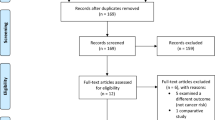Abstract
Currently, three prediction models are used to predict a patient’s risk of having Lynch syndrome (LS). These models have been validated in probands with colorectal cancer (CRC), but not in probands presenting with endometrial cancer (EMC). Thus, the aim was to determine the performance of these prediction models in women with LS presenting with EMC. Probands with EMC and LS were identified. Personal and family history was entered into three prediction models, PREMM(1,2), MMRpro, and MMRpredict. Probabilities of mutations in the mismatch repair genes were recorded. Accurate prediction was defined as a model predicting at least a 5% chance of a proband carrying a mutation. From 562 patients prospectively enrolled in a clinical trial of patients with EMC, 13 (2.2%) were shown to have LS. Nine patients had a mutation in MSH6, three in MSH2, and one in MLH1. MMRpro predicted that 3 of 9 patients with an MSH6, 3 of 3 with an MSH2, and 1 of 1 patient with an MLH1 mutation could have LS. For MMRpredict, EMC coded as “proximal CRC” predicted 5 of 5, and as “distal CRC” three of five. PREMM(1,2) predicted that 4 of 4 with an MLH1 or MSH2 could have LS. Prediction of LS in probands presenting with EMC using current models for probands with CRC works reasonably well. Further studies are needed to develop models that include questions specific to patients with EMC with a greater age range, as well as placing increased emphasis on prediction of LS in probands with MSH6 mutations.
Similar content being viewed by others
Abbreviations
- HNPCC:
-
Hereditary non-polyposis colorectal cancer
- CRC:
-
Colorectal cancer
- MSI:
-
Microsatellite instability
- EMC:
-
Endometrial cancer
- MMR:
-
Mismatch repair
References
Lynch HT, de la Chapelle A (1999) Genetic susceptibility for non-polyposis colorectal cancer. J Med Genet 36:801–818
Hampel H, Frankel WL, Martin E et al (2005) Screening for the Lynch syndrome (hereditary nonpolyposis colorectal cancer). N Engl J Med 352:1851–1860
Hampel H, Frankel W, Panescu J et al (2006) Screening for Lynch syndrome (hereditary nonpolyposis colorectal cancer) among endometrial cancer patients. Cancer Res 66(15):7810–7817
Hampel H, Stephens JA, Pukkala E et al (2005) Cancer risk in hereditary nonpolyposis colorectal cancer syndrome: later age of onset. Gastroenterology 129(2):415–421
Aarnio M, Sankila R, Pukkala E et al (1999) Cancer risk in mutation carriers of DNA-mismatch-repair genes. Int J Cancer 81(2):214–218
Vasen HF, Watson P, Mecklin JP, Lynch HT (1999) New clinical criteria for hereditary nonpolyposis colorectal cancer (HNPCC, Lynch syndrome) proposed by the international collaborative group on HNPCC. Gastroenterology 116:1453–1456
Syngal S, Fox EA, Eng C, Kolodner RD, Garber JE (2000) Sensitivity and specificity of clinical criteria for non-polyposis colorectal cancer associated mutations in MSH2 and MLH1. J Med Genet 37:641–645
Ramsoekh D, Wagner A, van Leerdam ME et al (2008) A high incidence of MSH6 mutations in Amsterdam criteria II-negative families tested in a diagnostic setting. Gut 57(11):1539–1544
Umar A, Boland CR, Terdiman JP et al (2004) Revised Bethesda guidelines for hereditary nonpolyposis colorectal cancer (Lynch syndrome) and microsatellite instability. J Natl Cancer Inst 96:261–268
Pinol V, Castells A, Andreu M, Castellvi-Bel S, Alenda C, Llor X (2005) Accuracy of revised Bethesda guidelines, microsatellite instability, and immunohistochemistry for the identification of patients with hereditary nonpolyposis colorectal cancer. JAMA 293(16):1986–1994
Balmana J, Stockwell DH, Steyerberg E et al (2006) Prediction of MLH1 and MSH2 mutations in Lynch syndrome. JAMA 296:1469–1478
Chen S, Wang W, Lee S et al (2006) Prediction of germline mutations and cancer risk in the Lynch syndrome. JAMA 296:1479–1487
Barnetson RA, Tenesa A, Farrington SM et al (2006) Identification and survival of carriers of mutations in DNA mismatch-repair genes in colon cancer. N Engl J Med 354:2751–2763
Schmeler KM, Lynch HT, Chen LM et al (2006) Prophylactic surgery to reduce the risk of gynecologic cancers in the Lynch syndrome. N Engl J Med 354:261–269
Lu KH, Dinh M, Kohlmann W et al (2005) Gynecologic cancer as a “sentinel cancer” for women with hereditary nonpolyposis colorectal cancer syndrome. Obstet Gynecol 105(3):569–574
Wijnen J, de Leeuw W, Vasen H, van der Klift H, Møller P (1999) Familial endometrial cancer in female carriers of MSH6 germline mutations. Nat Genet 23:142–144
Lipton LR, Johnson V, Cummings C et al (2003) Refining the Amsterdam criteria and Bethesda guidelines: testing algorithms for the prediction of mismatch repair mutation status in the familial cancer clinic. J Clin Oncol 21(23):4364–4370
Devlin LA, Graham CA, Price JH, Morrison PJ (2008) Germline MSH6 mutations are more prevalent in endometrial cancer patient cohorts than hereditary non polyposis colorectal cancer cohorts. Ulster Med J 77(1):25–30
Wagner A, Hendriks Y, Meijers-Heijboer EF et al (2001) Atypical HNPCC owing to MSH6 germline mutations: analysis of a large Dutch pedigree. J Med Genet 38(5):318–322
Hendriks YM, Wagner A, Morreau H et al (2004) Cancer risk in hereditary nonpolyposis colorectal cancer due to MSH6 mutation. Gastroenterology 64:4721–4727
Geary J, Sasieni P, Houlston R et al (2008) Gene-related cancer spectrum in families with hereditary non-polyposis colorectal cancer (HNPCC). Fam Cancer 7(2):163–172
Plaschke J, Engel C, Krüger S, Holinski-Feder E, Pagenstecher C, Mangold E (2004) Lower incidence of colorectal cancer and later age of disease onset in 27 families with pathogenic MSH6 germline mutations compared with families with MLH1 or MSH2 mutations: the German hereditary nonpolyposis colorectal cancer consortium. J Clin Oncol 22:4486–4494
Kolodner RD, Tytell JD, Schmeits JL et al (1999) Germ-line MSH6 mutations in colorectal cancer families. Cancer Res 59:5068–5074
Author information
Authors and Affiliations
Corresponding author
Rights and permissions
About this article
Cite this article
Backes, F.J., Hampel, H., Backes, K.A. et al. Are prediction models for Lynch syndrome valid for probands with endometrial cancer?. Familial Cancer 8, 483–487 (2009). https://doi.org/10.1007/s10689-009-9273-5
Received:
Accepted:
Published:
Issue Date:
DOI: https://doi.org/10.1007/s10689-009-9273-5




